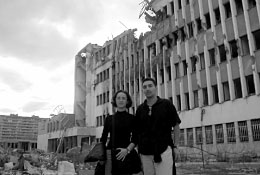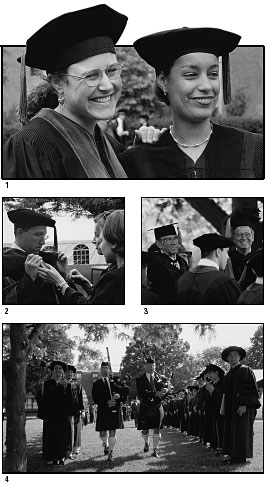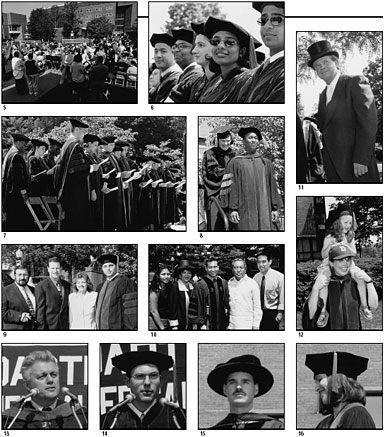The weather offers auspicious omens on Class Day 2000
On a day as significant as a graduation, it can be tempting to see omens in the weather. June 10, the date of DMS's Class Day 2000, dawned with beautifully clear skies. A warm sun shone down on the family members and friends of the graduates as they gathered in midmorning in the Derzon Courtyard of DMS's Hanover campus. A brass band played traditional tunes, while the musicians' instruments sparkled with bright reflections. Draped on the stage were the brilliantly colored hoods that would soon be bestowed on the graduates; the velvet linings of green, purple, yellow, and blue— representative of the students' varied futures—looked lustrous in the sunlight.

|
|
Lili Bajraktari and Florian Gegaj, medical students at Kosovo's University
of Pristina, left behind scenes of devastation like this to spend several months
this summer at Dartmouth, where they worked in various clinical settings. |
Robes: The festivities began with a procession, the faculty in their academic garb leading a long stream of graduates clad in black robes with Dartmouth green accents.
Dean John Baldwin, elegant in tails and a top hat, took the stage to open the ceremony. He urged the graduating students to acknowledge the "help of family and friends in the process of growth and discovery you are finishing today." Baldwin also urged the students to remain young because, in a world of revolutionary change, "young people will take the lead."
The dapper dean then introduced the event's keynote speaker, John Irving—best-selling novelist, award-winning screenwriter, and a native of New Hampshire. Irving, who won an Oscar in 1999 for the screenplay of his own novel The Cider House Rules, told the gathering of physicians and scientists, "I am a most unscientific novelist and screenwriter. . . . I gave one fictional patient enough anesthesia to put everyone here to sleep," he admitted.
Irving, who has become identified as an advocate for abortion rights, acknowledged that he'd been asked both to speak on that issue and to avoid it. The Cider House Rules deals with abortion, but Irving said he "never intended to write a novel and film about abortion." He began the book from a love of storytelling, not "moral outrage." He wanted to tell a story about the relationship between a doctor and an orphan. Yet as he researched the subject, he found that the decision to perform abortions was pivotal to orphanage hospitals, for such institutions often saw the results of unwanted pregnancies. "So, in The Cider House Rules, I made abortion a secret and an issue," he said, "but it was never a secret and an issue I went looking for."
Advice: Addressing the graduates, Irving advised, "If some of you become abortion providers, I hope the rest will be accepting." He also argued against legislatures and other governmental bodies imposing nonscientific judgments on medical decisionmaking. "Congress should not dictate to doctors how doctors should do their job," he said.
Although some members of the audience expressed quiet disagreement with his remarks by remaining seated, Irving got a mostly standing ovation on the conclusion of his speech.
Lesson: Lori Arviso Alvord, M.D., associate dean of student and minority affairs, then introduced Adrian Rossi, the medical student speaker. Rossi, who came to DMS after being a research assistant in anesthesiology at the University of Virginia, reflected on the first day of medical school and the ordeal of learning how to draw blood on his fellow students. He then found a lesson in this experience, theorizing that a unique characteristic of his chosen field is the simple fact that doctors touch people. "We touch people to diagnose them. We touch people to fix them. When we cannot fix them, we touch people to comfort them. And beginning with blooddrawing on that first day of medical school, we learned these skills from each other."
Rossi speculated that the way his class had interacted emotionally would influence how they touched their future patients emotionally. He felt they had been uniquely supportive and caring and that "that will make us not just talented doctors but compassionate physicians."
Next, Constance Brinckerhoff, Ph.D., associate dean for science education, introduced Jonathan Cruz, the graduate student speaker. Cruz—who investigated the damage done by "bad cholesterol" in the lab of biochemist T.Y. Chang, Ph.D.—described confronting the bane of all graduation speakers: identifying a topic. He turned to something fundamental to his chosen field: the scientific method. "What we often don't realize," he said, "is that this method can be used not only to explain scientific phenomena, but also to make sense of everyday life."
Cruz proceeded through the five steps of the scientific method to explain his presence at Class Day. First, he formulated the question: "Why are we here?" Then he formed a hypothesis, that "we have an inherent love for what we do."
For the next step, he predicted, "we must have tried hard, made sacrifices, and persevered." The fourth step of the scientific method is data collection, and Cruz suggested that this process was still incomplete because "our work is far from over." And so to his fellow graduates he said, "I challenge you all to be brave enough to continue pursuing what makes you happy."
The final step, reaching a conclusion, is thus, he said, "an ongoing process that is lifelong and constantly evolving."
Hoods: Brinckerhoff, together with Roger Sloboda, Ph.D., Gerald O'Connor, Ph.D., D.Sc., and H. Gilbert Welch, M.D., M.P.H., then conferred hoods on the master's and doctoral candidates. There were seven Ph.D. graduates in the biomedical sciences, as well as one Ph.D. and 25 M.A.'s in the evaluative clinical sciences.
Baldwin stepped back up to the lectern to present the Dean's Medal, an award for the best overall record of achievement for a medical student, to Christine Mackey. The John W. Strohbehn Medal for Excellence in Biomedical Research went to Ronald Kaltreider for his work in pharmacology and toxicology. The other awards presented to the graduates, both at Class Day and at the Graduation Luncheon earlier in the week, are listed in the box on page 5.
Awards: Three faculty who had been selected by the graduating medical students as recipients of the 2000 teaching awards— David Nierenberg, M.D., and Deborah Peltier, M.D., in the clinical sciences and William Mosenthal, M.D., in the basic sciences—then hooded the 61 M.D. candidates. (The class had also conferred the Thomas P. Almy Housestaff Teaching Award, on surgery resident Patrick Ting, M.D.)
Finally, John Rassias, a renowned Dartmouth College language professor, took the lectern to explicate the 2,500-year-old Hippocratic Oath for the new physicians who would be taking it for the first time. Rassias pointed out that Hippocrates referred to medicine as "my art," thus linking it to broad human concerns. Rassias also noted that "the oath binds all who take it to specific moral practices." Baldwin concluded the ceremony by leading all the physicians present in reading a translation of a statement whose origins are as old as Western culture.
The graduates and the faculty then recessed to a reception under a nearby tent, as the sun rose further toward its zenith and the day grew even brighter.
Jonathan Weisberg
Student Prizes & Awards
Dean's Medal
Christine Mackey
John W. Strohbehn Medal for Excellence in Biomedical Research
Ronald Kaltreider
Douglas P. Zipes, M.D., Research Prize in Medicine
Karleyton Evans
Good Physician Award
Joseph Vitterito
John and Sophia Zaslow Prize
Leah von Reyn Cream
Saul Blatman Award for Excellence in Maternal and Child Health
Christine Mackey
Frederic P. Lord Award in Anatomy
Vladimir Grigoryants
French Distinguished Student Award in Pathology
Thomas Golembeski
Janet M. Glasgow Achievement Citations
Christine Mackey, Elisa Thompson Ruksznis
Healthcare Foundation of New Jersey Humanism in Medicine Award
Elizabeth Kellogg Wolfe
Julian and Melba Jarrett Memorial Prize
Michael Betsy
Merck Manual Awards
Allison Fegley, Travis Matheney
Arthur Naitove Surgical Scholar Award
Vladimir Grigoryants
New England Pediatric Society Award
Betsy Sandberg Liolios
Department of Psychiatry Award for Excellence in Clinical Psychiatry
Karleyton Evans
John F. Radebaugh Community Service Award
Kristine Parke
Department of Diagnostic Radiology Award for Excellence in Radiology
Nepenthe Fong
Hilda Weyl Sokol Award
Jennifer Eggers
Department of Medicine Award
Christine Mackey
Department of Anesthesiology Outstanding Graduating Student Award
Carlos Cream
Dartmouth-Mosenthal Surgical Society
David Chismark, Allison Fegley, Keith Fournier,
Vladimir Grigoryants, Travis Matheney, Thomas Stamp,
Christopher Vinton, Derek Woodrum
Rolf C. Syvertsen Fellow
Derek Woodrum
Rolf C. Syvertsen Scholars
Michael Betsy, Robyn Byer, Christine Mackey,
Christopher Vinton, Joseph Vitterito

|
|
Smiles, sunshine, and shades were all much in evidence at Class Day 2000.
1 Maya Mitchell and Pascal Anglade revel in the occasion, while 2 Keith
Fournier gets a little help fastening his robe and 3 faculty convene for the
procession. 4 Then bagpipers Travis Matheney (left) and James Feeney—
both members of the M.D. class—lead the way as the ceremony begins.
5 The sun shone on the outdoor proceedings, impelling 6 Gira Shah and
Kaushal Shah (not related to each other) to don shades. Highlights of the
event included 7 the reading of the Hippocratic Oath, 8 the hooding of the
graduates (here, internist Deborah Peltier bestows an M.D. hood on Derik
Davis), and countless family photo ops, including for 9 M.D. grad Mike
Betsy and 10 Ph.D. grad Jonathan Cruz. Faces in the crowd included
11 Dean John Baldwin, 12 Elizabeth Wolfe and a young friend, 13 keynote
speaker John Irving, 14 medical student speaker Adrian Rossi, and the winners
of the top two prizes—15 Ronald Kaltreider and 16 Christine Mackey. |

|
If you would like to offer any feedback about this article, we would welcome getting your comments at DartMed@Dartmouth.edu.
